Court of Appeal in Abuja on Friday granted leave to the presidential candidate of the Labour Party, Peter Obi, as well as his counterpart in the Peoples Democratic Party, Atiku Abubakar, to have access to all the sensitive materials the Independent National Electoral Commission (INEC) used for the conduct of the February 25 presidential election.
A panel of the appellate court led by Justice Joseph Ikyegh made the order after it heard two separate ex parte applications the two aggrieved presidential candidates filed alongside their political parties.
Read Also: Wike: Current Power Shift To Southern Region Has Corrected Rational Presidency
Listed as respondents in the matter were INEC, All Progressives Congress, and its presidential candidate, Bola Tinubu, who was declared the winner of the election and is now the President-elect.
Both applications were predicated on Section 146 (1) of the Electoral Act 2022, Paragraph 47 (1, 2 &3) of the First Schedule of the Electoral Act of 2022, as well as under the inherent jurisdiction of the court as referenced by Section 6 (6) A & B of the 1999 Constitution (as amended).
While Obi in his application moved by his team of lawyers, led by Mr Alex Ejesieme (SAN), sought six principal reliefs, Atiku’s lawyer, Adedamola Faloku, sought seven prayers from the tribunal.
Specifically, the applicants urged the court to compel INEC to allow them to obtain documents it used for the presidential election. They maintained that the requested documents would aid their petition against the outcome of the presidential contest.
They asked for
An order directing the 1st Respondent, that is, the Independent National Electoral Commission, to allow the applicants to inspect all the electoral materials used in the conduct of the election for the Office of President of the Federal Republic of Nigeria held on the 25th day of February, 2023.
An order granting the applicants’ permission to do electronic scanning and make photocopies of voter’s registration, ballot papers used in the conduct of the election for the office of the President of the Federal Republic of Nigeria held on the 25th day of February, 2023.
An order granting leave to the applicants to carry out Digital Forensic Inspection of BVAS machines used for the conduct of the 25th February, 2023 election for the Office of President of the Federal Republic of Nigeria.
The plaintiffs also sought an order restraining “the First Respondent from tampering with the information embedded in the BVAS machines until due inspection was conducted and Certified True Copies of them issued”.
Read Also: Six States Charge Supreme Court To Cancel Presidential Election
Upon consideration of the motion, the Affidavit in support deposed to by Julius Mba and the written address of counsels, the court ordered,
That the First Respondent, that is Independent National Electoral Commission is hereby directed to allow the applicants inspect all the electoral materials used in the conduct of the Election for the office of President of the Federal Republic of Nigeria held on (February) 25th. That the applicants are hereby permitted to do electronic scanning and/or make photocopies of Voter’s Registration, Ballot Papers used in the conduct of the election for the office of the President of the Federal Republic of Nigeria held on the 25th day of February, 2023.
That leave is hereby granted to the applicants to carry out Digital Forensic Inspection of BVAS machines used for the conduct of the 25th February, 2023 Election for the office of President of the Federal Republic of Nigeria.
Earlier on Wednesday, INEC had declared Tinubu of the APC as the winner of the presidential poll ahead of 17 other candidates that contested the election. However, both the PDP and LP rejected the outcome of the election and vowed to challenge it in court.
According to INEC, Tinubu scored a total of 8,794,726 votes to defeat Atiku who polled a total of 6,984,520 votes and Obi who came third with a total of 6,101,533 votes.

